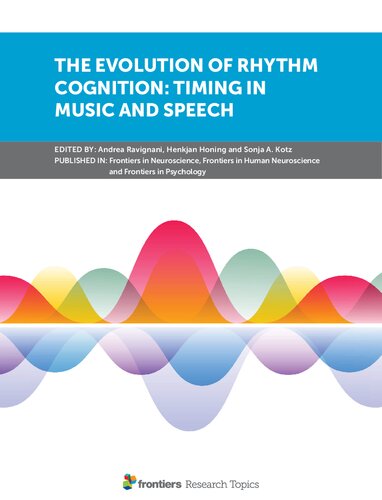Product desciption
The Evolution Of Rhythm Cognition Timing In Music And Speech Andrea Ravignani by Andrea Ravignani, Henkjan Honing, Sonja A. Kotz 9782889455003, 2889455009 instant download after payment.
Human speech and music share a number of similarities and differences. One of the closest similarities is their temporal nature as both (i) develop over time, (ii) form sequences of temporal intervals, possibly differing in duration and acoustical marking by different spectral properties, which are perceived as a rhythm, and (iii) generate metrical expectations.
Human brains are particularly efficient in perceiving, producing, and processing fine rhythmic information in music and speech. However a number of critical questions remain to be answered: Where does this human sensitivity for rhythm arise? How did rhythm cognition develop in human evolution? How did environmental rhythms affect the evolution of brain rhythms? Which rhythm-specific neural circuits are shared between speech and music, or even with other domains?
Evolutionary processes’ long time scales often prevent direct observation: understanding the psychology of rhythm and its evolution requires a close-fitting integration of different perspectives. First, empirical observations of music and speech in the field are contrasted and generate testable hypotheses. Experiments exploring linguistic and musical rhythm are performed across sensory modalities, ages, and animal species to address questions about domain-specificity, development, and an evolutionary path of rhythm. Finally, experimental insights are integrated via synthetic modeling, generating testable predictions about brain oscillations underlying rhythm cognition and its evolution.
Our understanding of the cognitive, neurobiological, and evolutionary bases of rhythm is rapidly increasing. However, researchers in different fields often work on parallel, potentially converging strands with little mutual awareness. This research topic builds a bridge across several disciplines, focusing on the cognitive neuroscience of rhythm as an evolutionary process. We welcome contributions encompassing, although not limited to: (1) developmental and comparative studies of rhythm (e.g. critical acquisition periods, innateness); (2) evidence of rhythmic behavior in other species, both spontaneous and in controlled experiments; (3) comparisons of rhythm processing in music and speech (e.g. behavioral experiments, systems neuroscience perspectives on music-speech networks); (4) evidence on rhythm processing across modalities and domains; (5) studies on rhythm in interaction and context (social, affective, etc.); (6) mathematical and computational (e.g. connectionist, symbolic) models of “rhythmicity” as an evolved behavior.
We envision contributions from cognitive, social and affective neuroscience, developmental psychology, psycholinguistics, phonology, music cognition, animal behaviour, comparative cognition, system neuroscience, artificial intelligence, etc. This research topic will contain novel empirical findings and state of the art reviews of hot topics in each discipline, constituting a reference volume on the evolution of rhythm cognition.
We welcome all submission formats, with emphasis on the following Frontiers Article types: Original Research (presenting original experiments or novel analyses of empirical data), Methods (introducing new experimental paradigms), Hypothesis and Theory (suggesting testable hypotheses), and Mini Review (focused on a specific theme and aimed at a broad audience of researchers in neighboring fields). Manuscripts, although of an interdisciplinary nature, must have a primary focus on psychology or neuroscience, as expressed in the mission statements of Frontiers in Psychology and Frontiers in Human Neuroscience.
Important Note: All contributions to this Research Topic must be within the scope of the section and journal to which they are submitted, as defined in their mission statements. Frontiers reserves the right to guide an out-of-scope manuscript to a more suitable section or journal at any stage of peer review.


